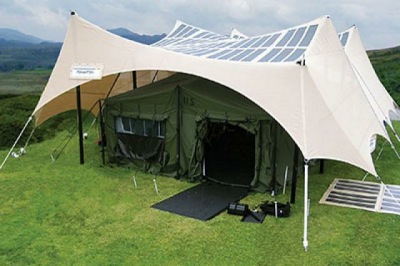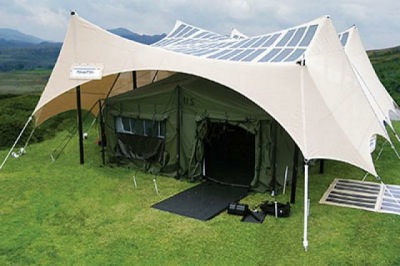 Long thought to be the sole domain of quiche-eating pantywaists, solar energy has finally picked up some macho cachet — by saving lives and dollars in Afghanistan. A Marine company that deployed solar panels for its energy needs reports that its diesel fuel consumption dropped by almost 90 percent. Plus, alternative energy keeps soldiers safer by limiting how often they need to go out for fuel.
Long thought to be the sole domain of quiche-eating pantywaists, solar energy has finally picked up some macho cachet — by saving lives and dollars in Afghanistan. A Marine company that deployed solar panels for its energy needs reports that its diesel fuel consumption dropped by almost 90 percent. Plus, alternative energy keeps soldiers safer by limiting how often they need to go out for fuel.
Fuel use is a major malfunction: In a New York Times op-ed last week, retired brigadier general Steven M. Anderson laid out the reasons why the military seriously needs to revamp its energy use:
An across-the-board Pentagon efficiency mandate would have many benefits. First, it would save many lives: there are casualties in one out of every 24 fuel supply convoys in Afghanistan; 47 drivers were killed there last year. It would save money; it costs taxpayers about $66 million a day for air-conditioning in the war zones.
It would also reduce opportunities for the enemy. Some soldiers jokingly call the fuel trucks “Taliban targets,” and for good reason — they are a high-payoff quarry for insurgents using nothing but homemade bombs. In addition, having fewer fuel shipments would allow NATO to take highly trained troops off convoy duty and use them in combat or, even better, send them home.
A proving ground for solar: The experience of this test company shows that moving to solar isn’t just a good theory — it also works. The solar-powered company consumed almost 90 percent less diesel fuel. Wired reports:
One of the company’s squad leaders, Staff Sgt. David Doty, said that the energy generated by the solar panels has dropped his generators’ fuel consumption from 20 gallons a day to just 2.5 gallons. And the more gas the Marines save with solar power, the less they’ll have to truck in through convoys that insurgents shoot at and blow up. The panels also allow Patrol Base Sparks to use its generators less at night, cutting down on noise that can tip insurgents off to the Marines’ positions.
Those tactical gains make the military virtues of energy efficiency more plain than anything policymakers or think-tankers can say, according to Christine Parthemore of the Center for a New American Security. “The benefit to the lack of noise and attention drawn to the [base] because of not having to run the generators — no one was talking about that six months ago,” Parthemore says.
Safer, cheaper, easier, and less deadly: In addition to saving money and reducing vulnerable fuel runs, the solar tech is also simpler to deal with in the field. From SmartPlanet:
The solar systems also ease the complexity of logistics. “These are very simple systems. You’re not always worried about doing preventative maintenance on a generator or vehicle to power the [command operation center],” Capt. Adorjan Ferenczy, an engineering officer at the Marine Corps Warfighting Lab, said in a press release.
Some tactical trade-offs: NPR reports that a stateside test of solar power generated (ha) some complaints. Quantico, Virginia doesn’t have as much direct bright sunlight as Afghanistan, and some soldiers reported that the solar units took a lot of babysitting and were slow to charge up batteries. Solar may not be a good solution for every unit, in every type of war zone. But it appears that in Afghanistan it can save money, energy, and lives.
Yeah, we’d all prefer a scenario where there wasn’t a war going on, and the government was using this money to provide green energy alternatives for young people who were residing safely in their hometowns. But as long as there’s a war and the young people are out getting shot at instead, we like the idea that green energy can save lives and pick up some mainstream cred in the bargain.




